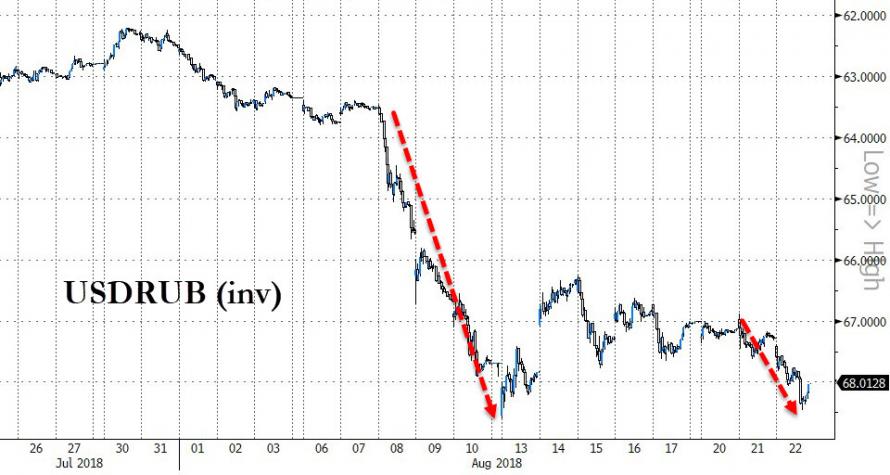For years, Russian oligarchs and robber barons seeking to park their “unsourced” capital offshore and away from the sticky fingers of the Kremlin, treated Swiss bank accounts (preferably anonymous) with their “no questions asked” customer policies as, well, Swiss bank accounts. No more. One of Switzerland’s largest banks, Credit Suisse, has frozen roughly 5 billion Swiss francs ( billion) of money linked to Russia to avoid violating U.S. sanctions, according to its accounts, further increasing pressure on Moscow which today saw the ruble tumble to the lowest level in over two years. The crackdown on Russian funds by the second largest Swiss bank, which owned aircraft surrendered by Russian tycoon Oleg Deripaska and
Topics:
Tyler Durden considers the following as important: 1) SNB and CHF, Credit Suisse, Featured, newsletter
This could be interesting, too:
investrends.ch writes UBS zahlt für CS-Steuerstreit mit US-Justizministerium weitere halbe Milliarde
Nachrichten Ticker - www.finanzen.ch writes Die Performance der Kryptowährungen in KW 9: Das hat sich bei Bitcoin, Ether & Co. getan
Nachrichten Ticker - www.finanzen.ch writes Wer verbirgt sich hinter der Ethereum-Technologie?
Martin Hartmann writes Eine Analyse nach den Lehren von Milton Friedman
| For years, Russian oligarchs and robber barons seeking to park their “unsourced” capital offshore and away from the sticky fingers of the Kremlin, treated Swiss bank accounts (preferably anonymous) with their “no questions asked” customer policies as, well, Swiss bank accounts.
No more. One of Switzerland’s largest banks, Credit Suisse, has frozen roughly 5 billion Swiss francs ($5 billion) of money linked to Russia to avoid violating U.S. sanctions, according to its accounts, further increasing pressure on Moscow which today saw the ruble tumble to the lowest level in over two years. The crackdown on Russian funds by the second largest Swiss bank, which owned aircraft surrendered by Russian tycoon Oleg Deripaska and had lent money to Russian oligarch Viktor Vekselberg before the sanctions, is indicative of the widespread fear among European banks of retaliation by Washington for working with targeted Russian individuals and entities. “Credit Suisse works with international regulators wherever it does business to ensure compliance with sanctions, including compliance with sanctions involving Russia,” a bank spokeswoman told Reuters. The bank is complying with the latest round of anti-Russia sanctions announced in April by U.S. Treasury Secretary Steven Mnuchin meant to penalize Russia for its annexation of Crimea, involvement in the war in Syria and “attempting to subvert Western democracies”. |
USD/RUB, Monthly Jul 2018 - Aug 2018 |
And more is expected to follow, as Trump scrambles to prove to Robert Mueller that he did no collude with Putin.
A popular financial and tourist hub for wealthy Russians with its combination of bank secrecy, political stability and glitzy ski resorts such as Zermatt and St. Moritz, Switzerland has become one of the most important destinations for money leaving Russia. Which is why, for Russia’s elite, such steps will close off an important avenue for finance as well as a safe haven for billions of rubles of their wealth.
Roughly $6.2 billion, or 14% of total Russian cross-border outflows, went to Switzerland in 2017: three times as much as went to the United States, according to the Russian central bank.
That money could now be blocked after earlier this month, members of Congress called for more action, including introducing new sanctions legislation “from hell”, to punish the Russian “menace.”
And while the U.S. sanctions do not apply to neutral Switzerland, its banks are obliged to comply because they depend on access to the dollar and could be blackballed by the United States for any missteps, a demonstration of the implied US veto power on global financial transactions that use “neutral” Swift as an intermediary and the reason behind yesterday’s call by Germany’s foreign minister Heiko Maas for the creation of a new payments system independent of the US.
Going back to Switzerland, the Credit Suisse asset freeze took place in the second quarter, according to Reuters, a rare event for a Swiss bank to reveal such details. Two of the bank’s biggest rivals, UBS and Julius Baer said they also respected international sanctions, but declined to say whether they had taken similar steps.
“UBS … implements worldwide at least the sanctions currently imposed by Switzerland, the U.N., the EU and the U.S.,” said a spokesman for UBS. A spokesman for Julius Baer told Reuters that it “cooperates with international regulators … in the field of sanction regulations”.
Understandable, Credit Suisse’s caution is the result of earlier bad experiences, most recently with the Trump administration when in 2009 the bank reached a $500 million settlement with U.S. authorities over dealings with sanctions-hit Iran.
Other European banks have also been punished for ignoring US dominance in global fund flows: in 2014, France’s BNP Paribas agreed to pay a record $8.9 billion for violating U.S. sanctions against Sudan, Cuba and Iran.
Meanwhile, the Swiss banking regulator FINMA does not require Swiss banks to enforce foreign sanctions, but has said they have a responsibility to minimize legal and reputational risks. In other words, it is the US which continues to call the shots even in “neutral” Switzerland.
As for what venue rich Russians will pick to park their wealth next, we are confident that China will be delighted to hold their billions “safe and sound.” That, or they rediscover that when it comes to avoiding capital controls, few currencies are as effective as cryptos.
Tags: Credit Suisse,Featured,newsletter

